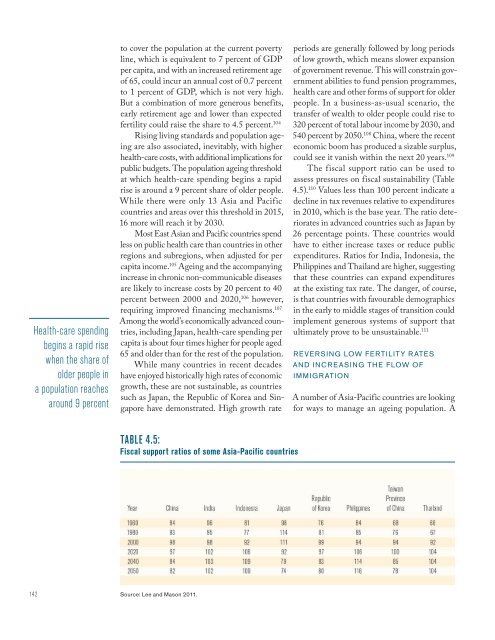SHAPING THE FUTURE HOW CHANGING DEMOGRAPHICS CAN POWER HUMAN DEVELOPMENT
1VPo4Vw
1VPo4Vw
You also want an ePaper? Increase the reach of your titles
YUMPU automatically turns print PDFs into web optimized ePapers that Google loves.
Health-care spending<br />
begins a rapid rise<br />
when the share of<br />
older people in<br />
a population reaches<br />
around 9 percent<br />
to cover the population at the current poverty<br />
line, which is equivalent to 7 percent of GDP<br />
per capita, and with an increased retirement age<br />
of 65, could incur an annual cost of 0.7 percent<br />
to 1 percent of GDP, which is not very high.<br />
But a combination of more generous benefits,<br />
early retirement age and lower than expected<br />
fertility could raise the share to 4.5 percent. 104<br />
Rising living standards and population ageing<br />
are also associated, inevitably, with higher<br />
health-care costs, with additional implications for<br />
public budgets. The population ageing threshold<br />
at which health-care spending begins a rapid<br />
rise is around a 9 percent share of older people.<br />
While there were only 13 Asia and Pacific<br />
countries and areas over this threshold in 2015,<br />
16 more will reach it by 2030.<br />
Most East Asian and Pacific countries spend<br />
less on public health care than countries in other<br />
regions and subregions, when adjusted for per<br />
capita income. 105 Ageing and the accompanying<br />
increase in chronic non-communicable diseases<br />
are likely to increase costs by 20 percent to 40<br />
percent between 2000 and 2020, 106 however,<br />
requiring improved financing mechanisms. 107<br />
Among the world’s economically advanced countries,<br />
including Japan, health-care spending per<br />
capita is about four times higher for people aged<br />
65 and older than for the rest of the population.<br />
While many countries in recent decades<br />
have enjoyed historically high rates of economic<br />
growth, these are not sustainable, as countries<br />
such as Japan, the Republic of Korea and Singapore<br />
have demonstrated. High growth rate<br />
periods are generally followed by long periods<br />
of low growth, which means slower expansion<br />
of government revenue. This will constrain government<br />
abilities to fund pension programmes,<br />
health care and other forms of support for older<br />
people. In a business-as-usual scenario, the<br />
transfer of wealth to older people could rise to<br />
320 percent of total labour income by 2030, and<br />
540 percent by 2050. 108 China, where the recent<br />
economic boom has produced a sizable surplus,<br />
could see it vanish within the next 20 years. 109<br />
The fiscal support ratio can be used to<br />
assess pressures on fiscal sustainability (Table<br />
4.5). 110 Values less than 100 percent indicate a<br />
decline in tax revenues relative to expenditures<br />
in 2010, which is the base year. The ratio deteriorates<br />
in advanced countries such as Japan by<br />
26 percentage points. These countries would<br />
have to either increase taxes or reduce public<br />
expenditures. Ratios for India, Indonesia, the<br />
Philippines and Thailand are higher, suggesting<br />
that these countries can expand expenditures<br />
at the existing tax rate. The danger, of course,<br />
is that countries with favourable demographics<br />
in the early to middle stages of transition could<br />
implement generous systems of support that<br />
ultimately prove to be unsustainable. 111<br />
REVERSING LOW FERTILITY RATES<br />
AND INCREASING <strong>THE</strong> FLOW OF<br />
IMMIGRATION<br />
A number of Asia-Pacific countries are looking<br />
for ways to manage an ageing population. A<br />
TABLE 4.5:<br />
Fiscal support ratios of some Asia-Pacific countries<br />
142<br />
Source: Lee and Mason 2011.


